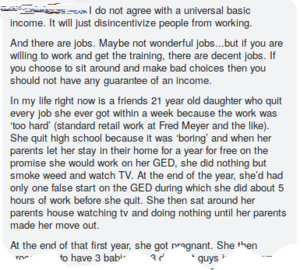Myths/people need incentives to work
| Myth: People need to be incentivized in order to perform work. |

The Myth
If people have everything they need without working, then they won't work.
Examples
People need to be incentivized to make better life choices, get job training, and work.
They do not need to be incentivized to sit around and do nothing on the government dime, pushing out more babies to get more money....and teaching those children to sit around themselves with their hands out.[1]
Reality
The evidence is that there is very little correlation between being paid and putting in effort, despite widespread belief to the contrary:
Psychological research has shown that rewards only yield "temporary compliance": Your behavior might change for a period of time, but it'll eventually slide back like so many failed diets.[2]
So much of economic theory is based on the idea that people respond to incentives, the key ones being profit and wages. Many economists will tell you that the reason capitalism is successful and we all have such high living standards is because it is able to incentivise people, whereas other forms like socialism, give people no reason to produce, so they don’t.
[...]
But if you think about it, this doesn’t make sense. Most people are paid a fixed salary based on how many hours they work, not how much they produce. Their wage is set in advance and they receive it regardless of how much or little effort they put in. In the vast majority of jobs, it is not possible to measure an individual’s productivity or even monitor if they are doing their job. Furthermore, most jobs pay a wage based on the tasks of the employee, even though it is obvious that not everyone will do the task equally well. There is only the weakest relation between what workers give in productivity and what they receive in wages.
The simple fact is that most people’s income is unrelated to their productivity.[3]
It is difficult to overstate the extent to which most managers and the people who advise them believe in the redemptive power of rewards.
[...but...]
at least two dozen studies over the last three decades have conclusively shown that people who expect to receive a reward for completing a task or for doing that task successfully simply do not perform as well as those who expect no reward at all. These studies examined rewards for children and adults, males and females, and included tasks ranging from memorizing facts to creative problem-solving to designing collages.[4]
Footnotes
- ↑ 2019-10-16, Facebook, private comment
- ↑ 2019-09-03, Business Insider: Americans care more about work-life balance than money
- ↑ 2015-10-28 Whistling in the Wind: Why Do People Work Hard When They Have No Economic Incentive To Do So? (quote rearranged slightly for clarity)
- ↑ 1993-09 Harvard Business Review: Why Incentive Plans Cannot Work